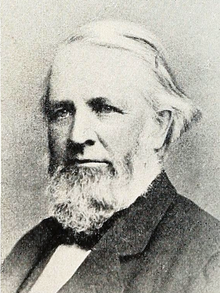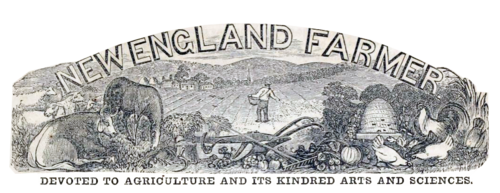| Henry F. French | |
|---|---|
 Henry F. French c. 1866 Henry F. French c. 1866 | |
| Assistant District Attorney of Suffolk County, Massachusetts | |
| In office 1862–1865 | |
| President of the Massachusetts Agricultural College (now the University of Massachusetts Amherst) | |
| In office 1864–1866 | |
| United States Assistant Secretary of the Treasury | |
| In office 1876–1885 | |
| Personal details | |
| Born | Henry Flagg French (1813-08-14)August 14, 1813 Chester, New Hampshire |
| Died | November 29, 1885(1885-11-29) (aged 72) Concord, Massachusetts |
| Spouse(s) | Anne Richardson (1838-1856) Pamela Mellen Prentiss (1859-1885) |
| Alma mater | Harvard Law School |
| Signature | |
Henry Flagg French (August 14, 1813 – November 29, 1885) was an American agriculturalist, inventor, lawyer, judge, postmaster, writer, assistant secretary of the treasury, and the first president of the Massachusetts Agricultural College (now the University of Massachusetts Amherst). He was also a prominent figure in many agricultural societies, a vice president of the United States Agricultural Society, and a patent holder. He is perhaps best known for his development and popularization of the French drain, as well as being the father of renowned sculptor Daniel Chester French, who created the iconic statue of Abraham Lincoln central to the Lincoln Memorial.
Early life
Henry Flagg French was born in Chester, Rockingham County, New Hampshire, on August 14, 1813, to the Honorable Daniel French (1769–1840), who was attorney general of New Hampshire and Sarah Wingate Flagg Bell French (1782–1878). He died November 29, 1885, in Middlesex County, Concord, Massachusetts. He is buried at Exeter Cemetery, in Rockingham County, New Hampshire.
Education
| This section does not cite any sources. Please help improve this section by adding citations to reliable sources. Unsourced material may be challenged and removed. Find sources: "Henry F. French" – news · newspapers · books · scholar · JSTOR (April 2024) (Learn how and when to remove this message) |
He received his general education at Pinkerton Academy in Derry and then at Pembroke, and after that at Hingham, Massachusetts. He first studied law at the law office of his father Daniel French, and attended Harvard Law School.
Marriages
| This section does not cite any sources. Please help improve this section by adding citations to reliable sources. Unsourced material may be challenged and removed. Find sources: "Henry F. French" – news · newspapers · books · scholar · JSTOR (April 2024) (Learn how and when to remove this message) |
On October 9, 1838, he married Anne Richardson (1811–1856), daughter of William Merchant Richardson (1774–1838), chief justice of New Hampshire. They had four children: Henriette Van Mater French Hollis (1839–1911), William Merchant Richardson French (1843–1914), Sarah Flagg French Bartlett (1846–1883), and Daniel Chester French (1850–1931).
Three years after Anne Richardson's death, on September 29, 1859, he married Pamela Mellen Prentice, (1821–1895). They had no children.
Career
| This section needs additional citations for verification. Please help improve this article by adding citations to reliable sources in this section. Unsourced material may be challenged and removed. Find sources: "Henry F. French" – news · newspapers · books · scholar · JSTOR (April 2024) (Learn how and when to remove this message) |
He was admitted to the bar on August 14, 1834 (his 21st birthday). He practiced law in Chester for five years, until his father's death in 1840. In 1839, he succeeded his father as postmaster in Chester. He then moved to Portsmouth, where he lived for one year, and then in 1842 he moved to Exeter and continued to practice law there until August 1855. He was a county solicitor from 1838 to 1848 and a bank commissioner from 1848 to 1852. He was justice of the court of common appeals from 1855 to 1859. He was district attorney for Suffolk County from 1862 to 1865. From 1852 to 1859 he was president of the Rockingham Agricultural Society. From 1865 to 1866 he was president of the Massachusetts Agricultural College. In 1852, he received honorary Master of Arts degree from Dartmouth College. On August 15, 1855, he was appointed justice of the court of common appeals. He held that office until August 1, 1859.
In September 1859, he opened a law office in Boston. In 1860, he moved his family to Cambridge, where he continued to live for some years. On November 19, 1862, he was appointed assistant district attorney and held that position until July 1865. In September 1865 he moved to Amherst. In 1867 he resumed his law practice in Boston. In 1876 he was appointed by President Grant as 2nd assistant secretary of the United States Treasury, where he served until 1885.
Selected works
Although he only published one full book, French was a very prolific writer and wrote hundreds of articles for a number of agricultural journals:
- Farm Drainage; the Principles, Processes, and Effects of Draining Land, French's treatise giving full details on tile drainage and the use of the French drain.
- English Plows and Plowing, Report of the Commissioner of Patents for the Year 1859, Agriculture . p. 139-160. Advances in plowing methods and technologies such as the steam plow.
- Observations on English Husbandry.Report of the Commissioner of Patents for the Year 1860, Agriculture . p. 140-165.
- Agricultural Colleges, Report of the Secretary of Agriculture for the Year 1865. p. 137-186. A thorough history of agricultural colleges in the United States and Europe, along with their academic curricula.

In the span of nearly 20 years Henry F. French wrote over 120 articles for the New England Farmer, a paper operated by his brother-in-law, Simon Brown, which circulated around New England and much of the Northeast United States, with letters from readers as far away as Maryland. The subjects of these articles were diverse, with many having strictly practical advice, while others being more humanitarian and philosophical in nature. Topics covered include French's travels to Europe farm maintenance, drainage, orcharding, dairy farming, women's rights, the advantages of an education, and various thoughts on establishing a more agrarian, egalitarian American society.
|
|

|
|
Notes
- Contrary to some posthumous biographies, French never actually attended college, only going to law school so he to study for the state bar exams. This was brought up in a letter by his daughter, Harriet V. French, after a Mr. W.H. Bowker mistakenly said French was a Dartmouth alumnus in his dedication speech of UMass Amherst's French Hall.
References
- ^ "Henry Flagg French: Owings Stone Family Genealogy". owingsstone.com. Retrieved August 24, 2020.
- "Ever wonder why it's a 'French drain'? It's got nothing to do with France". The Washington Post. Retrieved July 15, 2015.
- Profile, Massachusetts.edu. Accessed April 19, 2024.
External links
- Works by Henry F. French at Project Gutenberg
- Works by or about Henry F. French at the Internet Archive
| Presidents and chancellors of the University of Massachusetts Amherst | |
|---|---|
| Presidents |
|
| Chancellors | |